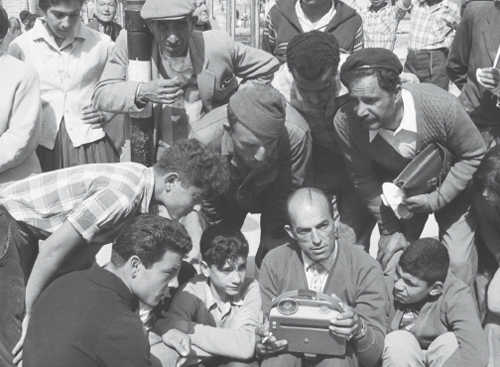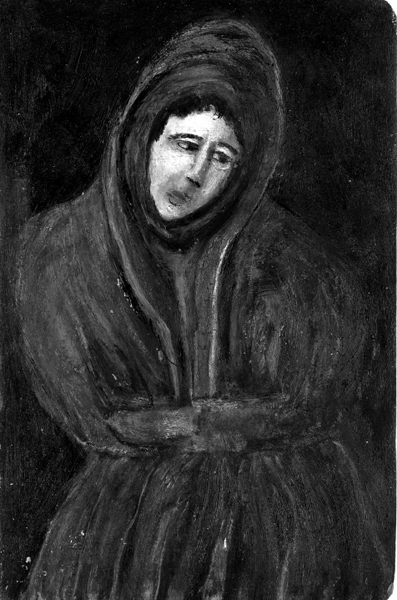
The Eichmann trial was almost more important in the field of education than in that of justice. David Ben-Gurion achieved his ambition: The trial educated the Israeli public, particularly the young, about the true nature of the Holocaust. And, after sixteen years of silence, it allowed survivors to openly share their experiences.

Jews in Jerusalem listen to Eichmann’s trial on a portable radio.
In the rest of the world, the intense media coverage and the wave of Eichmann biographies and fantastic accounts of his capture rooted the Holocaust in the collective cultural consciousness. The Shoah, as it was also known, was not to be forgotten, and an outpouring of survivor memoirs, scholarly works, plays, novels, documentaries, paintings, museum exhibits, and films followed in the wake of the trial and still continues today. This consciousness, in Israel and throughout the world, is the enduring legacy of the operation to capture Adolf Eichmann.
As for the Eichmann family, Vera and her youngest son, Ricardo, moved back and forth between Buenos Aires and West Germany for several years before settling in Osterburken, forty miles west of Heidelberg, in West Germany. Vera never accepted that her husband was guilty of his crimes, nor did she get over his execution. Ricardo scarcely remembers his father, and the Eichmann name is a weight that he continues to carry. Now a professor of archaeology in Germany, he recognizes the terrible deeds of Adolf Eichmann and is reluctant to speak about him. Of the three older sons, Horst continues to live in Buenos Aires and is reportedly a neo-Nazi leader. Dieter and Nick moved back to Germany, to Lake Constance, on the Rhine. They remain convinced that their father just obeyed orders and that most of what was said against him at the trial was false. Beyond that, they do not wish to discuss him.
Fritz Bauer, whose involvement remained a secret for two decades, moved quickly on the cases of other war criminals already under investigation. In the weeks after Ben-Gurion’s announcement, Bauer and his fellow West German prosecutors arrested a host of former Nazis implicated in the atrocities, including several of Eichmann’s deputies. Right up to his death in 1968, the Hesse Attorney General cracked down on German fascist groups and campaigned vigorously to unseat former Nazis from power.
Simon Wiesenthal won a tremendous amount of attention for his contribution to the hunt for Adolf Eichmann. Encouraged by the renewed public interest in war crimes, he returned to hunting Nazis and spent forty-five years promoting “justice, not vengeance.”
Before the operation to catch Eichmann unfolded, Sylvia Hermann left Argentina for the United States, where she still lives today. In 1971, Lothar Hermann received a reward from Israel for information leading to the arrest of Eichmann. Until then, his and his daughter’s role in the capture had been kept a secret.
For the Mossad agents whose families had been devastated by the Nazis, their participation carried an even greater personal satisfaction. In 1967, while on a job in Athens, Malkin received a call from Avraham Shalom, who told him that Malkin’s mother had been rushed to the hospital. Malkin returned to Tel Aviv on the first flight out and went straight to her bedside. Her eyes were closed, her face ashen. He tried to speak to her, but it didn’t seem like she heard him.
“She can’t talk,” said the old woman in the neighboring bed.
“Mama,” Malkin whispered in her ear, “I want to tell you something. What I promised, I have done. I got Eichmann.”
His mother did not open her eyes, nor did she turn her head. It had been seven years since Malkin had grabbed Eichmann on Garibaldi Street. He had kept the secret from her because of the oath he had sworn, but now he could not bear for her to die without knowing what he had accomplished.
“Mama, Fruma was avenged. It was her own brother who captured Adolf Eichmann.”
“She can’t hear you,” said the old woman, growing impatient with his visit.
Just as he was losing hope, Malkin felt a hand cover his, and then his mother grasped his hand tightly.
“Do you understand?” Malkin asked her.
Her eyes fluttered open. “Yes,” she said. “I understand.”

My Sister Fruma, a painting Peter Malkin completed while guarding Eichmann.